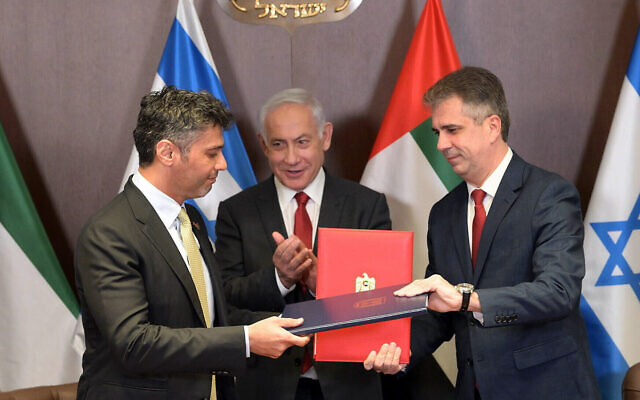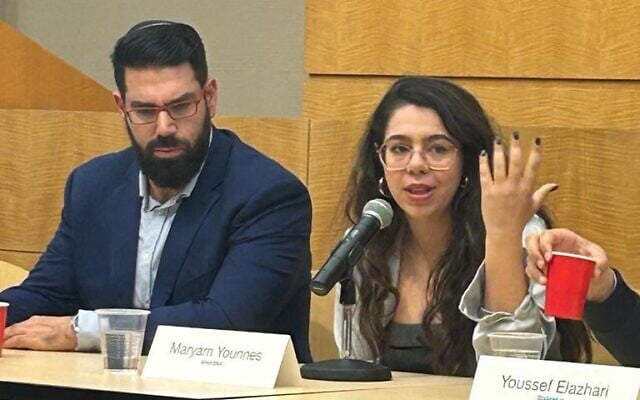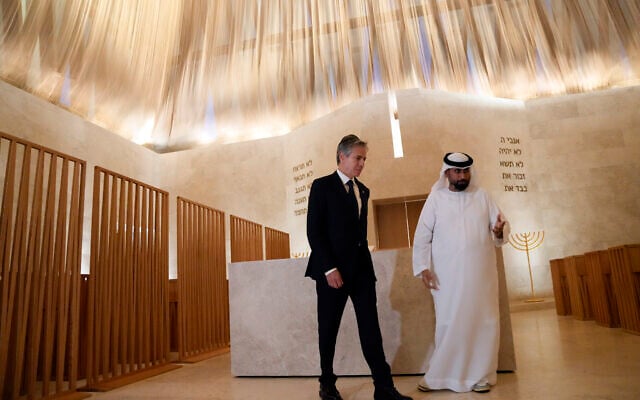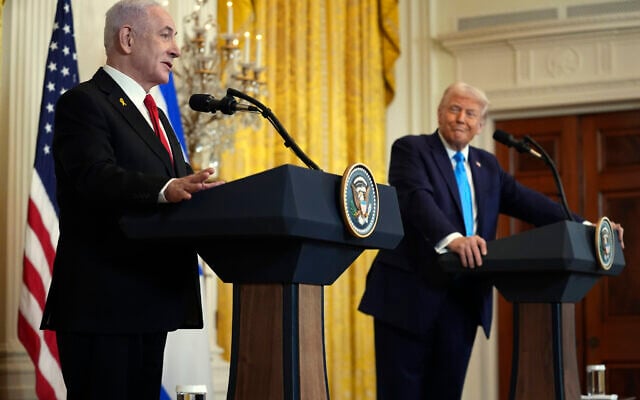


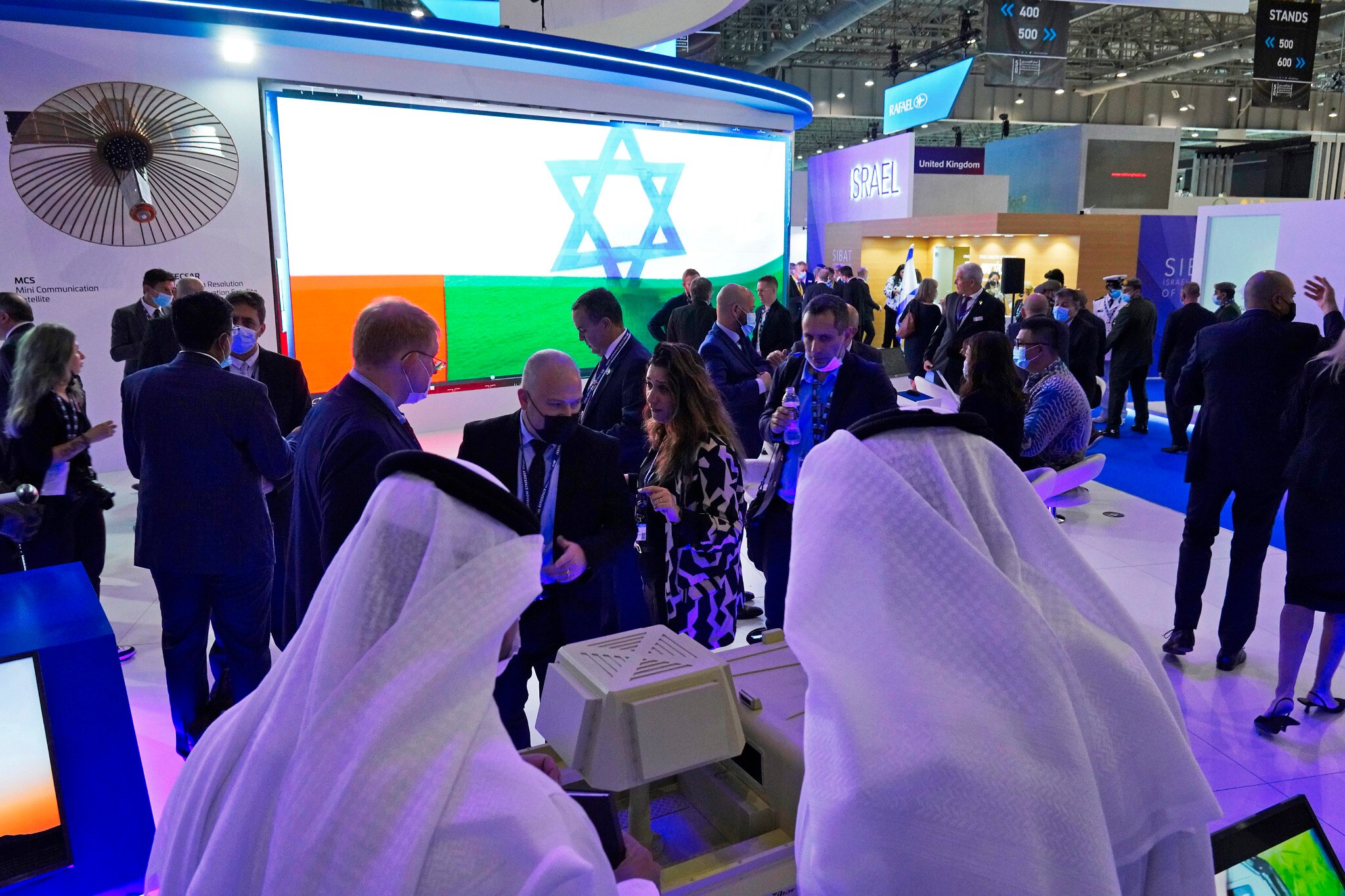
ABU DHABI — Trade between the United Arab Emirates and Israel grew 11% between 2023 and 2024 despite fierce objections to the war in Gaza that have led some in the oil-rich state to call for cutting newly established ties with the Jewish state.
While its government is staunchly anti-Hamas, the UAE has been hugely critical of Israel’s military actions and has vocally condemned the tens of thousands of Palestinian deaths in the Gaza Strip.
As such, it has been a diplomatic tightrope walk for the UAE as voices at home wonder if the Abraham Accords — brokered by US President Donald Trump during his first administration — could survive. Public diplomacy between the two countries has gone all but silent.
“How can we have relations with Israel when there is no two-state solution? And how can we say Hamas are terrorists and not brand the settlers terrorists with everything they’re doing?” said one senior Emirati official speaking with The Times of Israel on condition of anonymity.
Not all of Israel’s actions during the war are criticized: Israel’s record-time destruction of Hezbollah’s leadership and weakening of Hamas have been welcome in the UAE, which banned the Muslim Brotherhood in 2014 and has for years had a fractious relationship with Iran and its Shia militias such as the Houthis in Yemen.
“Netanyahu did what everyone wanted with Hezbollah and Hamas,” said the Emirati official, immediately adding that the Israeli prime minister is a war criminal who should be tried at the International Criminal Court for the death and destruction in Gaza.
Trade has been a key component of the 2020 accords normalizing relations between Israel and several Arab states, including the UAE — which has seen the highest trade growth of all.
According to the Israel Central Bureau of Statistics, trade between Israel and the UAE — excluding software and deals directly between the governments — totaled some $3.2 billion in 2024.
A free-trade agreement came into place in record time, with billions of dollars worth of investment secured within months of the deal coming into place in sectors ranging from healthcare to security.
Ties between Israel and the UAE have certainly been sunnier than Israel’s relationships with Egypt and Jordan.
Ahmed Alkhuzaie, a Bahraini political analyst based in Washington, said the latest trade rise reflects the deeper relations between Israel and the UAE than those brought on by Israel’s decades-long peace treaties with its neighbors, which have stood more as a cold peace spotted by disputes.
“The accords are more stable than the peace treaties signed with Jordan and Egypt. October 7 proved that. Israel’s GDP was surely affected, but not as many would think. The only flights to and from Israel that remained unaffected by the war were the ones coming from UAE,” Alkhuzaie told The Times of Israel, referring to the October 7, 2023, Hamas-led terror onslaught on southern Israel that left 1,200 dead and 251 taken hostage to Gaza, and subsequent war in Gaza.
The UAE retained its ambassador in Tel Aviv even while it fiercely campaigned at the UN Security Council for measures to impose a ceasefire in Gaza. It also sent record amounts of aid to the embattled Strip, opened a field hospital there, and evacuated hundreds of Gazans for medical treatment in Abu Dhabi.
“The UAE did not withdraw its ambassador and retained the Israeli ambassador in Abu Dhabi as it saw more benefits in doing this than otherwise,” said Alkhuzaie. “Remaining in contact during times of tragedy is more important than doing so in times of peace and that showcased how the accords proved to be stronger than expected.”
Given that the nature of bilateral trade between Israel and the UAE is mostly state-to-state, Alhhuzaie said it will still take time for civilian ties to grow deeper.
“The relations will take a much longer time [to grow] by Arab citizens in general than by governments due to the long-lasting conflict and the emotions involved towards the Palestinians,” he said. “This will take time and a lot of effort to change; as a result, the trade evolution will eventually grow to be between companies and individuals as well — which is [already] there — but it’s minimal.”
Dan Feferman, the executive director of Sharaka — an NGO that has worked to bring together Israelis and citizens of the nations party to the Abraham Accords — sees a change in relations manifesting.
“People-to-people contact was affected for sure. Tensions run understandably high in the Arab world, but many, especially those who were part of the normalization efforts, remained connected and certainly concerned for the welfare of the average Israeli after October 7,” said Feferman.
The UAE’s criticism of Hamas after the October 7 atrocities and sympathy for the victims of the single most deadly day for Jews since the Holocaust reflected a changing mentality, said Feferman, adding that such sentiments were largely muted elsewhere in the Arab world.
“This is a generally positive development, but also shows the accords and the path we are on have a long way to go,” he said.
One Israeli living in Dubai, who asked to remain anonymous for security reasons in the wake of the murder of key Jewish community figure Rabbi Zvi Kogan in November, said local Jewish life — which had been covert for years prior to the accords — has been hit hard by the war.
“We have no community gatherings in Dubai, chagim [holidays] together; we are basically under the radar again, not least since the murder of Zvi. And for sure, it is not as easy to be openly Israeli now, and there is a definite hesitance about doing new business with Israelis,” they said.
“Those who already have business in process have been less affected, but it’s hit those of us looking for new business, no matter what the sector,” they added. “We are afraid. I am personally very cautious about who I share my nationality with. I don’t have a second passport, so I can’t pass for another nationality.”
Another member of the community who asked to remain anonymous told The Times of Israel: “The war has emboldened people to be more vocally anti-Israeli when they see us. There have been incidents of abuse received by community members which before the war were almost unheard of.”
As US President Donald Trump has publicized a plan to displace around 1.5 million Palestinians from Gaza and relocate them to states including Jordan and Egypt, the future of the accords once again comes into question.
Hopes for normalization with Saudi Arabia have been imperiled as the kingdom rejected Trump’s plan to take over Gaza within hours of its announcement, standing by its promise to secure a Palestinian state and rejecting any sort of displacement.
In the UAE, political commentator Abdulkhaleq Abdulla told The Telegraph Trump’s proposal to turn Gaza into a “riviera” was “probably the most stupid idea that came from Washington in years.”
“Trump’s announcement is designed to be provocative — and get people thinking. It highlights that something new needs to be done. This statement is… practically dead on arrival,” he said. “It really has all the elements of failure, and if Trump wants to please the Israelis then he is going to set back any changes for normalization with other countries in the region.”

